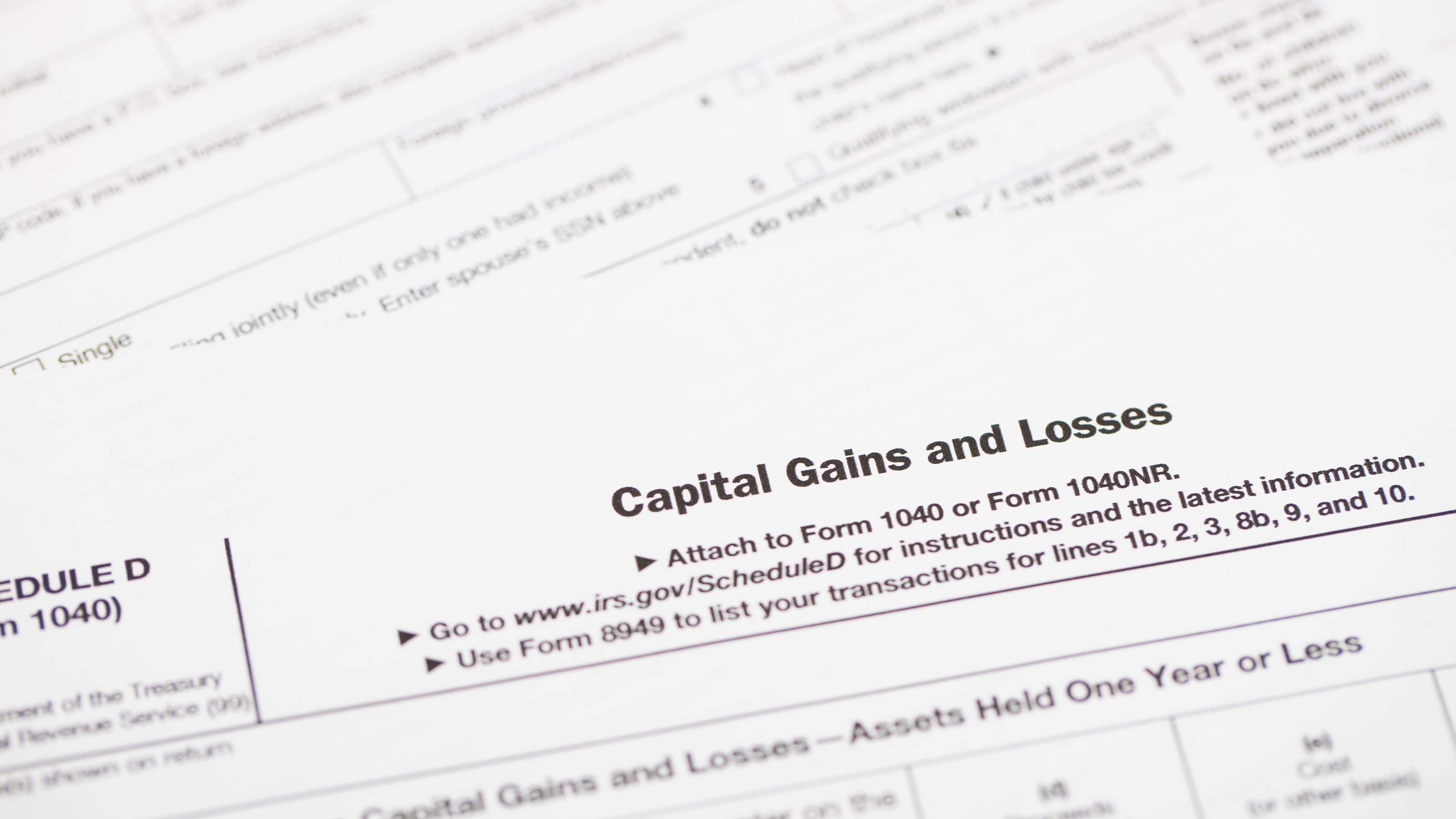Tax Breaks for Investors
You can carry over last year's losses to off-set taxes in years to come.

Profit and prosper with the best of Kiplinger's advice on investing, taxes, retirement, personal finance and much more. Delivered daily. Enter your email in the box and click Sign Me Up.
You are now subscribed
Your newsletter sign-up was successful
Want to add more newsletters?

Delivered daily
Kiplinger Today
Profit and prosper with the best of Kiplinger's advice on investing, taxes, retirement, personal finance and much more delivered daily. Smart money moves start here.

Sent five days a week
Kiplinger A Step Ahead
Get practical help to make better financial decisions in your everyday life, from spending to savings on top deals.

Delivered daily
Kiplinger Closing Bell
Get today's biggest financial and investing headlines delivered to your inbox every day the U.S. stock market is open.

Sent twice a week
Kiplinger Adviser Intel
Financial pros across the country share best practices and fresh tactics to preserve and grow your wealth.

Delivered weekly
Kiplinger Tax Tips
Trim your federal and state tax bills with practical tax-planning and tax-cutting strategies.

Sent twice a week
Kiplinger Retirement Tips
Your twice-a-week guide to planning and enjoying a financially secure and richly rewarding retirement

Sent bimonthly.
Kiplinger Adviser Angle
Insights for advisers, wealth managers and other financial professionals.

Sent twice a week
Kiplinger Investing Weekly
Your twice-a-week roundup of promising stocks, funds, companies and industries you should consider, ones you should avoid, and why.

Sent weekly for six weeks
Kiplinger Invest for Retirement
Your step-by-step six-part series on how to invest for retirement, from devising a successful strategy to exactly which investments to choose.
Last year's bear market was brutal for investors. If you cashed in some of your losers before the end of the year, you may take some solace when you file your 2008 return. You can use them to reduce you tax bill. And, if your income places you in one of the two lowest tax brackets, you will pay no capital gains tax for 2008 -- assuming you had any gains for the year.
Assets held for a year or less are considered short-term. Those held for more than a year are long-term. In figuring your taxes, you first must match any short-term gains with short-term losses and long-term gains with long-term losses. (These strategies apply to your taxable investment accounts, not your tax-deferred retirement accounts such as 401(k)s and IRAs.)
If, after netting capital gains and loses, you are left with a capital loss, you can use it to offset up to $3,000 of ordinary income. You can carry over excess losses to future tax years.
From just $107.88 $24.99 for Kiplinger Personal Finance
Become a smarter, better informed investor. Subscribe from just $107.88 $24.99, plus get up to 4 Special Issues

Sign up for Kiplinger’s Free Newsletters
Profit and prosper with the best of expert advice on investing, taxes, retirement, personal finance and more - straight to your e-mail.
Profit and prosper with the best of expert advice - straight to your e-mail.
Tax rates. A net short-term gain is taxed as ordinary income at rates ranging from 10% to 35%. For taxpayers in the 25% and higher brackets, long-term gains are taxed at 15%. Beginning in 2008, those in the 10% and 15% brackets pay no tax on long-term capital gains. And if you are normally in the 10% or 15% bracket but your capital gains pushes your total income above the 15% bracket, you will pay taxes only on the gains above the 15% level.
Here's how it works. Suppose a couple who files jointly has ordinary taxable income of $64,000 and long-term capital gains of $3,000. The top of the 15% income tax bracket for 2008 is $65,100 for couples ($32,550 for individuals). So $1,100 of their gains would benefit from the 0% rate. The remaining $1,900 would be taxed at the long-term capital gains rate of 15%.
Worthless stock. In most cases you can't deduct a loss on a stock unless you realized it by selling it before the end of the year. But there's an exception to that rule. You can deduct a loss on a worthless security without selling it. But you need evidence that the stock is wholly worthless with no chance that it will become valuable in the future. One good indicator is when a company is being liquidated in bankruptcy and the shareholder equity will be completely wiped out.
To write off a worthless stock, you report it on Schedule D as though you sold it for $0 on December 31. That date also determines whether you have a short -- or a long-term loss. In the section where you're asked for the sale date and selling price, just write "worthless." Your loss is the full cost of the stock.
Sign Up: Get Tax Tips E-mailed to You
Find more deductions with our Taxopedia. Plus see our Tax Center for all the tax information you need.
Profit and prosper with the best of Kiplinger's advice on investing, taxes, retirement, personal finance and much more. Delivered daily. Enter your email in the box and click Sign Me Up.

-
 Betting on Super Bowl 2026? New IRS Tax Changes Could Cost You
Betting on Super Bowl 2026? New IRS Tax Changes Could Cost YouTaxable Income When Super Bowl LX hype fades, some fans may be surprised to learn that sports betting tax rules have shifted.
-
 How Much It Costs to Host a Super Bowl Party in 2026
How Much It Costs to Host a Super Bowl Party in 2026Hosting a Super Bowl party in 2026 could cost you. Here's a breakdown of food, drink and entertainment costs — plus ways to save.
-
 3 Reasons to Use a 5-Year CD As You Approach Retirement
3 Reasons to Use a 5-Year CD As You Approach RetirementA five-year CD can help you reach other milestones as you approach retirement.
-
 The Most Tax-Friendly States for Investing in 2025 (Hint: There Are Two)
The Most Tax-Friendly States for Investing in 2025 (Hint: There Are Two)State Taxes Living in one of these places could lower your 2025 investment taxes — especially if you invest in real estate.
-
 The Final Countdown for Retirees with Investment Income
The Final Countdown for Retirees with Investment IncomeRetirement Tax Don’t assume Social Security withholding is enough. Some retirement income may require a quarterly estimated tax payment by the September 15 deadline.
-
 Tax-Advantaged Qualified Small Business Stock
Tax-Advantaged Qualified Small Business StockSmall Business If you own stock that meets the qualified small business stock (QSBS) rules, up to 100% of the gain on the sale of the shares is tax-free.
-
 States With Low and No Capital Gains Tax in 2025
States With Low and No Capital Gains Tax in 2025Capital Gains Low-tax states, including states with no capital gains tax, are selling points for many people.
-
 Which Capital Gains Are Taxable and How to Calculate Your Tax
Which Capital Gains Are Taxable and How to Calculate Your TaxCapital Gains Tax It's important to understand what capital gains tax is and how it's calculated, and what tax rates apply.
-
 Got Crypto? The IRS Really Wants to Know
Got Crypto? The IRS Really Wants to Knowtaxes The IRS remains focused on cryptocurrency and tax enforcement around other digital assets.
-
 The Wash Sale Rule: Six Things to Know to Avoid Tax Pitfalls
The Wash Sale Rule: Six Things to Know to Avoid Tax PitfallsInvesting The wash sale rule is important when you are selling and rebuying stocks to offset losses.
-
 Cryptocurrency and the Wash Sale Rule: A Tax Loophole That May Soon Go Away
Cryptocurrency and the Wash Sale Rule: A Tax Loophole That May Soon Go Awaycapital gains tax For now, cryptocurrency investors don’t have to worry about the wash sale rule. But the days of selling and immediately repurchasing virtual currencies may be numbered.